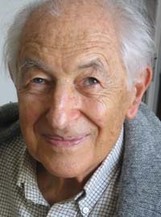Receive Our Newsletter
For news of readings, events and new titles.

Lorand Gaspar is a traveller, a poet, surgeon, scientist, historian, photographer and translator. He is recognised as one of France’s most important contemporary poets and over the years has received many awards for his work, including the Grand prix de poésie de la Ville de Paris (1987), the Prix Mallarmé (1993), the Grand prix national de Poésie (1995), and the Prix Goncourt de la poésie (1998). He has translated poetry from a number of languages, often in collaboration with Sarah Clair, including works of Raine Maria Rilke, János Pilinszky, D. H. Lawrence and Giorgis Seferis, while his own work has been translated into Hungarian, Romanian, German, Arabic, Greek, Spanish, Italian, English and other languages. He has written a study on Spinoza and in recent years has worked and published in the field of neuroscience – brain research and neuro-cognitive vision.
Lorand Gaspar was born in 1925 in the town of Marosvásárhely into a Hungarian Jewish family with Armenian heritage, growing up speaking Hungarian, Romanian and German, and learning French and later Latin, Greek and Arabic. Until the end of World War I the town had been Hungarian, in Transylvania. After the war it became Târgu Mures, in the Romania that it is today, still with half the population being Hungarian speakers. However, in the crucial years of 1940-1945, the town reverted back to Hungary. In 1943 Lorand attended Bucharest Technical School (now the Politehnica University of Bucharest) where he entertained a secret wish to become both a doctor and a poet, but when Hungary was occupied by the Nazis in 1944, his dream came to an end as he was mobilised and deported to a labour camp in South Germany. However, in May 1945 he escaped and joined a French unit in Pfullendorf. At the end of the war he found his way to Paris and began to study medicine. In 1954, married with three children, he moved to Jerusalem, taking the post of surgeon at the Bethlehem French Hospital. During the Six-Day War the hospital was severely damaged and his own house stripped and robbed. In 1968 he published Histoire de la Palestine (Maspero), the first of a number of prose and travel works, illustrated with his own photographs.
In 1970 he left Jerusalem and travelled to Tunis, for the next 25 years practising at the Charles Nicolle Hospital and living in the picturesque cliff-top village of Sidi Bou Said, not far from the ruins of ancient Carthage, which had already inspired the artists Paul Klee, Gustave-Henri Jossot and August Macke. In Tunis, with Jacqueline Daoud (who became his wife) and Salah Garmadi, he founded and co-edited Alif magazine, publishing 12 issues between 1970 and 1982 with the Tunisian Ceres Editions (founded in 1964).
Medicine and writing have always been inextricably linked in the work and life of Lorand Gaspar. He is as much fascinated by Rimbaud’s poetry as by Einstein’s theory of relativity. His first book (excerpted above), Le Quatrième État de la matière, published in 1966 by Flammarion, established him as a vibrant new creative voice, and in 1967 he was awarded the Guillaume Apollinaire Prize for the work. Lorand Gaspar then published further collections, with Gallimard, Sol absolu (1972), Approche de la parole (1978) (excerpted in Banipal 46 in translation by Mary Ann Caws), Égée suivi de Judée (1980), Feuilles d’observation (1986), Patmos et autres poèmes (2001), and Derrière le dos de Dieu (2010). One of the few translations into English is Four Poems, translated by Peter Riley (Shearsman Books, 1993. ISBN 9780907562184, 43pp.) Peter Riley has translated a few more poems of Lorand Gaspar, accessible only online.
Lorand Gaspar is the Guest Writer in Banipal 46.
Contributor's Issues